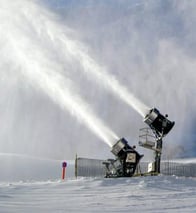USSA Advocates for Sustainability
At the end of October 2017, The U.S. Ski and Snowboard Association (USSA) put out an official statement of sustainability. The organization pledged to reduce its carbon footprint in order to preserve normal winter weather patterns, thus ensuring snowfall for future generations of winter athletes. Following their statement, USSA formed an internal sustainability committee, partnering up with the City of Park City, National Ski Areas Association (NSAA), and Protect our Winters (POW) to formally push their efforts.Climate Change Affecting Our Winters
The effects of global warming are detrimental to winter sports and are negatively impacting winter athletes on the world stage. In an article for USA Today, Olympian Steven Nyman voiced his opinion on the steady rise in earth’s temperature. "If we do not find the courage to kick our fossil fuel addiction and transition to clean energy, we will warm the atmosphere to the extent that areas currently covered in white could see only sporadic snow." USSA president, Tiger Shaw also voiced his view. "As a national and international leader in our sports, it is important for us to vocalize our position on climate change and join our athletes, members, and partners in inspiring change.”
Snow Line Rising
 The marked increase in the earth's warming means that snow is no longer a certainty. This past decade has been the warmest in earth's history causing the snow line in the Sierra Nevada (my home) to rise far above the normal range. Due to the warming climate, ski resorts have turned to man-made snow to replace the once steady snowfall. Man-made snow is a reliable short-term solution to the snow problem, but it requires more electricity to power the
The marked increase in the earth's warming means that snow is no longer a certainty. This past decade has been the warmest in earth's history causing the snow line in the Sierra Nevada (my home) to rise far above the normal range. Due to the warming climate, ski resorts have turned to man-made snow to replace the once steady snowfall. Man-made snow is a reliable short-term solution to the snow problem, but it requires more electricity to power the
Long-Term Solution - Renewable Energy
Renewable energy has long been recognized as a solution to global warming and climate change. The ski industry, having been directly affected is moving to implement clean energy solutions. This benefits the industry and the environment in two ways:
- Clean energy production offsets the added requirements of snow making
- Clean energy eliminates pollutants that cause warming in general
Squaw Valley USA, the host of the 1960 Winter Olympics, is a high profile example of this move to renewable energy. The ski area has partnered with Liberty Utilities to make its resort run fully on renewable energy by December 2018. The project will provide clean, renewable energy options to the resort and the towns surrounding Squaw Valley. Squaws actions support the state of California energy goals - to be 100% renewable by 2045.
-------------------------
Jasmine Arrison is a competitive ski racer and member of USSA. She is a blogger on sustainability and clean energy for DASolar.

